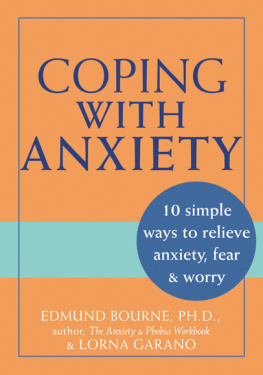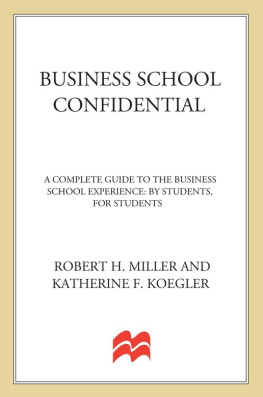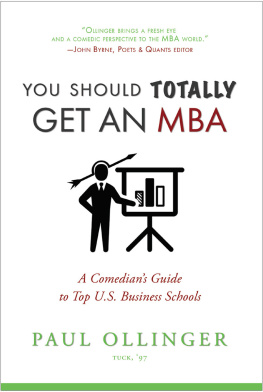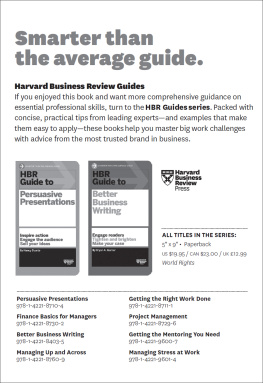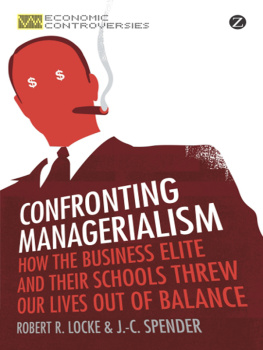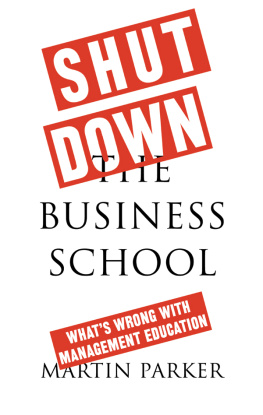
Coping with Anxiety
Edmund J. Bourne, Ph.D.
and Lorna Garano
New Harbinger Publications
Publishers Note
This publication is designed to provide accurate and authoritative information in regard to the subject matter covered. It is sold with the understanding that the publisher is not engaged in rendering psychological, financial, legal, or other professional services. If expert assistance or counseling is needed, the services of a competent professional should be sought.
Distributed in the U.S.A. by Publishers Group West; in Canada by Raincoast Books; in Great Britain by Hi Marketing, Ltd.; in South Africa by Real Books, Ltd.; in Australia by Boobook; and in New Zealand by Tandem Press.
Copyright 2003 by Edmund J. Bourne and Lorna Garano
New Harbinger Publications, Inc.
5674 Shattuck Avenue
Oakland, CA 94609
Cover design by Amy Shoup
Text design by Michele Waters
ISBN-10 1-57224-320-1 Paperback
ISBN-10 1-60882-481-2 ePub
All Rights Reserved
New Harbinger Publications Web site address:
www.newharbinger.com
For all who seek to find a more peaceful way to live
Ed Bourne
For my parents
Lorna Garano
Contents
Anxiety is increasingly prevalent in modern society. Approximately 15 percent of the population of the United States, or nearly 40 million people, have suffered from an anxiety disorder in the past year. Why is anxiety so common in our time? Is there something about contemporary society that especially promotes anxiety? Throughout history people have been exposed to challenging events in the form of wars, famines, plagues, and disease. Yet anxiety seems to be particularly characteristic of our modern era. Whats wrong?
In trying to account for the current prevalence of anxiety, at least three factors might be cited: the pace of modern life, a general lack of consensus about standards and values to live by, and the level of social alienation fostered by postindustrial society.
The pace of modern life has increased dramatically in recent decades. Films of people from fifty years ago show conclusively that people walked, drove, and lived more slowly than they do at present. Most of us live our lives in a state of constant doing, at odds with the natural rhythms of our bodies. Deprived of rest and time to just let ourselves be, we become detached from ourselves and more anxious.
Along with the rapid pace of daily life, we all face an unprecedented pace of social, technological, and environmental change. Our environment and social order have changed more in the past fifty years than they did in the preceding three hundred years. The rate of change is only likely to increase in the future. Without adequate time to assimilate and adjust to all of this change, we find ourselves growing more anxious.
Norms in modern life are highly pluralistic. There is no shared, consistent, socially-agreed-upon set of values and standards for people to live by, as there tended to be prior to 1960. In the vacuum left, most of us attempt to fend for ourselves, and the resultant uncertainty about how to conduct our lives leaves ample room for anxiety. Faced with a barrage of inconsistent world views and standards presented by the media, we are left with the responsibility of having to create our own meaning and moral order. When we are unable to find that meaning, many of us are prone to fill the gap thats left with various forms of escapism and addiction. We tend live out of tune with ourselves and thus find ourselves anxious.
Security and stability arise though connection: feeling connected to someone or something outside of yourself. Anxiety arises in the moment when you lose your sense of connectionto yourself, others, your community, nature, or perhaps your God or Higher Power. When you feel disconnected or alienated, youre more prone to perceive somethingalmost anythingas a potential threat to your security and well-being. If you look for the roots of anxiety in modern life, much of it appears to arise from a perception of threat in the absence of feeling connected.
Our present way of life in postindustrial society contributes in many ways to feelings of alienation and disconnection. Historically, people lived in intimate connection with nature. Contrast this with modern life, where we commute on freeways to get to work, eat processed food and wear clothes manufactured thousands of miles away, and spend a great deal of our time in front of TV or computer screens. One hundred years ago people knew their neighbors and members of their immediate community. Today, we live in single-family homes and apartment complexes where often we are barely acquainted with those around us. We may be so involved in our own lives that we become oblivious to (or threatened by) strangers who might need our help. In our great-grandparents era (and in some third-world countries at present), children were raised in the context of an extended family. Contrast this with modern society where we often move away from parents and siblings, raising our children in isolated nuclear families. And with the divorce rate at 50 percent, the nuclear family is often split, with children being shuttled back and forth.
The list could go on. Many of us are separated from our own hearts and souls by a variety of addictions ranging from alcohol and drugs to work, caretaking, or money and material goods. We are flooded with media images exhorting us to be perfect (or that we will be perfect if we buy the right item), reinforcing values of consumerism, materialism, and instant gratification that only serve to amplify the void many of us feel in our lives. Even our health-care system has become strictly profit oriented, with corporate HMOs cutting back on benefits, allowable tests, psychological treatment, and other services in order to protect the interests of their shareholders. All of these trends tend to aggravate our sense of insecurity, alienation, and feelings of insignificance. Add to this the steady threat of unprovoked terrorist attacks, and the picture is complete. We simply live in anxious times. Is it any wonder that anxiety is becoming increasingly prevalent?
An old saying advises: It is better to light a candle than curse the darkness. Since outer society and the media offer little refuge, it is necessary for each of us to ask what we can do for ourselves. Many of us are looking for solutions, simple ways that we can make our lives more peaceful and livable. This book strives to provide some help in that direction. Our aim here is to provide you with an array of simple tools to help you find greater calm and stability in the midst of complex, even chaotic times. By finding ways to relieve anxiety and create peace in your own life, you not only benefit yourself but become a helpful role model to those around you.
This is a book about how to cope with anxiety. Anxiety is an experience familiar to nearly everyone, and it seems increasingly prevalent amid the many stresses and complexities of modern life. About 25 percent of the adult population in the United States has a serious problem with anxiety at some time in their life.
Practical strategies are offered here to help you better handle your anxiety in all its forms. Before proceeding with these strategies, though, you may want to know a little more about the nature of anxiety itself. Anxiety comes in many shapes and sizes. Understanding the particular typeas well as the severityof your own issue with anxiety (for example, everyday anxiety versus a particular anxiety disorder) will help you to get a better idea of what youre dealing with. Beyond this, it is also useful to know something about the diverse causes of anxiety. Understanding where your particular issues with anxiety might have come fromand especially what causes are likely to keep it goingwill give you some reference points to determine which of the many strategies offered in this book might be most helpful.
Next page
